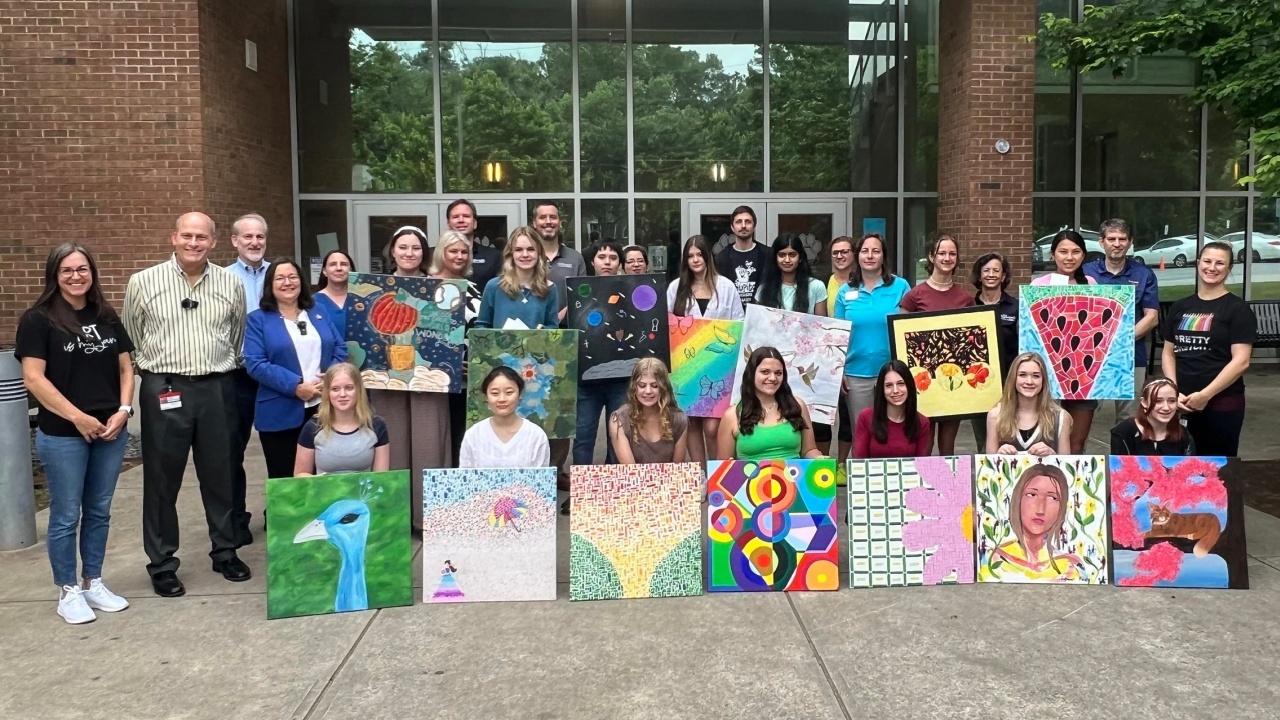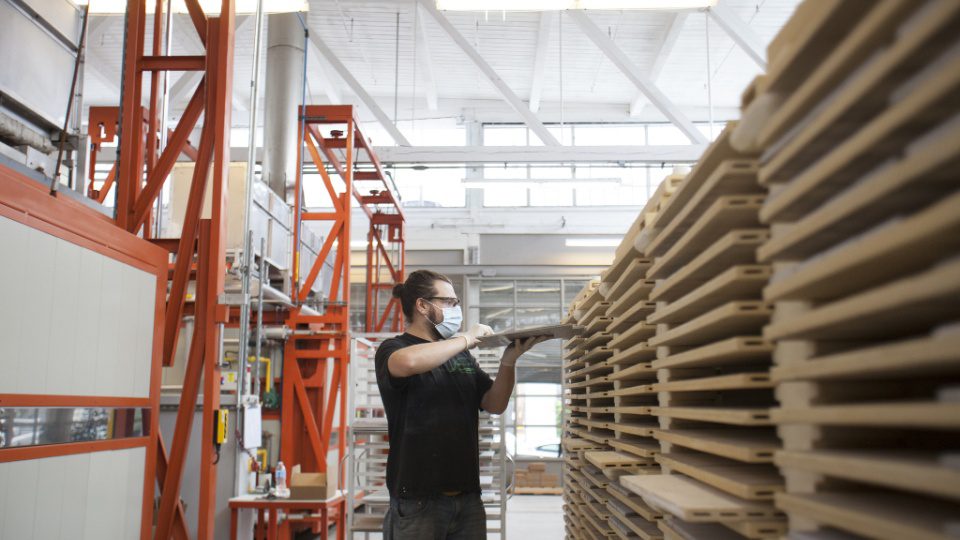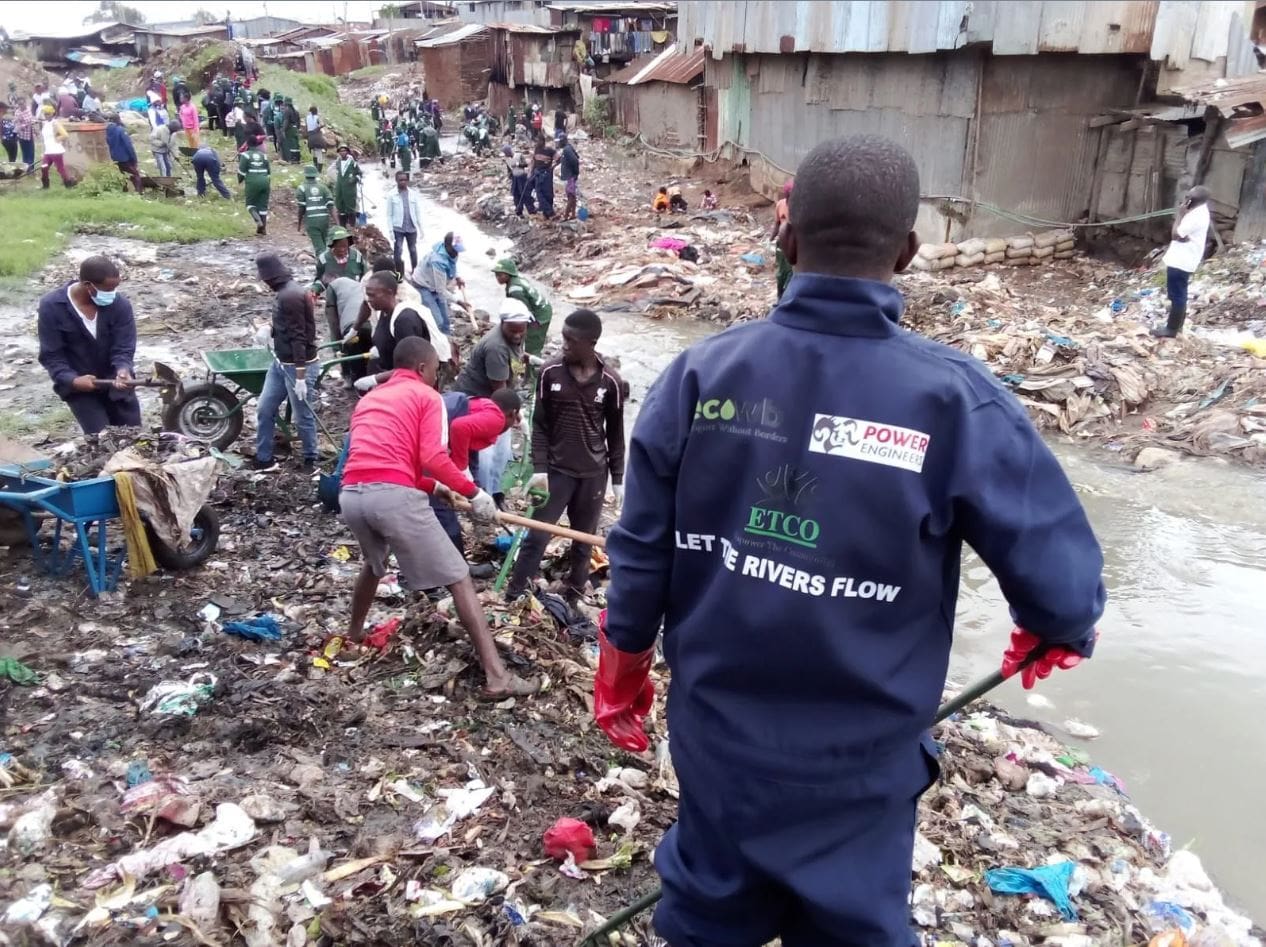The past four years have been difficult for us all, including nonprofit organizations, as we’ve navigated challenges posed by the global pandemic, including protecting the health of our workers and guarding against operational risk, all while continuing to provide essential services to our communities. We’ve also been buffeted by social unrest and racial inequities that our nation is still addressing and working to close. These multiple challenges have had a tremendous impact on all of us and the communities we serve – none more so than Native, Black, Latinx, Asian, and other communities of color.
As 2022 winds down, we’re taking a deep breath and checking in with several nonprofits of our IS community about their focus, plans, and hope for 2023:
Jina Krause-Vilmar, President and CEO, Upwardly Global

Jina Krause-Vilmar
Upwardly Global – a national nonprofit dedicated to eliminating employment barriers for immigrant and refugee professionals – envisions an equitable, welcoming country where everyone, including immigrants, refugees, and asylees, can restart careers and thrive. A year after crises in Afghanistan and Ukraine brought an influx of newcomers to the U.S., we’re looking to broaden and scale our support for immigrants and refugees in 2023.
If you haven’t heard of Upwardly Global – for over 20 years, we have empowered newcomers with the skills, coaching, and social capital needed to find gainful employment in the U.S. Today, we serve over 2,000 job seekers each year, supporting attainment of professional employment in high-demand industries like tech, health care, and finance. Our job seekers – 75% people of color and 50% women – earn an average starting salary of nearly $68,000, a “thriving wage” that represents an average income increase of over $60,000. Beyond direct service work, Upwardly Global leverages its expertise and thought leadership to transform hiring and workforce systems affecting immigrants and refugees.
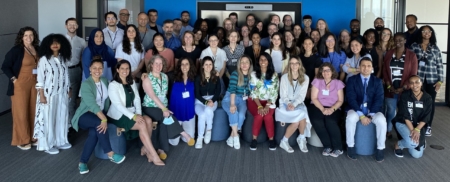
Photo courtesy of Upwardly Global
This coming year, Upwardly Global stands ready to work with increasing numbers of newcomers in need of support navigating the professional labor market, many otherwise facing underemployment and economic struggle in the U.S. Our career skills program will continue scaling outreach in newcomer communities, providing direct support to immigrant professionals from over 100 countries, including recent refugees from Venezuela, and anticipated groups from Haiti, Cuba, and beyond. To date, our program has already placed over 300 Afghans in skill-aligned jobs, and we anticipate hundreds more in 2023.
Our direct service program is a path to economic stability for thousands of refugees and immigrants, and it’s also an indicator of how to best deliver support. We are also working to build the capacity of workforce agencies, community colleges, and employers that want to support and hire immigrant and refugee professionals, who are often invisibilized. Over the next year, we plan to begin testing innovations that will increase both the efficiency of job placements and the quality of those jobs. We will also build out several critical tools to support thousands more job seeker placements and streamline our model across partner organizations and companies – including an AI tool, industry-specific career navigator courses, and workforce hiring systems.
Employers’ willingness and ability to hire immigrant and refugee talent is critical for our job seekers’ success and a driver of systems change to support inclusion in our country. In 2022, we developed the framework for an Employer Portal that will consolidate training and resources along with hiring dashboards tailored for employers looking to hire immigrant job seekers. We anticipate the portal’s launch in 2023.
In the new year, big plans to innovate and scale our services are on the horizon. Our job readiness program and inclusive hiring efforts already add $610 million in income for almost 10,000 immigrants and refugees. Looking to 2023, we hope to expand those efforts so that not one newcomer is left un- or under-employed, and all of us can thrive.
Sue Cunningham, President and CEO, Council for Advancement and Support of Education (CASE)
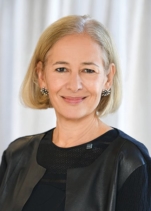
Sue Cunningham
In 2022, CASE launched our strategic plan, Championing Advancement: CASE 2022–2027 which centers on the steps necessary to define the competencies and standards for the profession of advancement, and lead and champion their dissemination and application across the world’s educational institutions. This work is important because the reputations of our institutions and the education sector writ large often rest on the important, strategic contributions of advancement professionals.
For 2023, this means we will continue to promulgate and improve the CASE Global Reporting Standards, which include our statement on ethics, principles of practice across the disciplines, and formal guidance for fundraising reporting. Adherence to professional standards enables institutions to rest firmly in the knowledge that their philanthropic and community engagements are rooted in community-derived ethics and expectations. We continue to offer our new online course on the Global Standards to help advancement professionals gain deeper working knowledge of them.
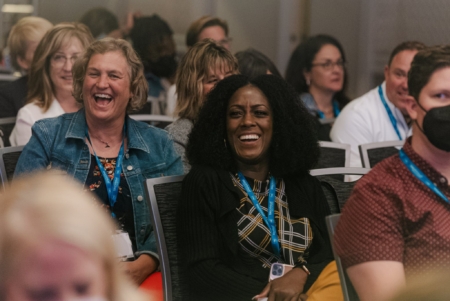
Photo courtesy of CASE
In 2023, we will launch our CASE Career Journey Framework. This Framework provides an architecture for career development across all advancement disciplines, answering the call advancement leaders are making for well-trained and equipped teams. The profession needs many more talented people to join its ranks, particularly people of diverse-lived experiences. Our Career Journey Framework and corresponding educational trainings and conferences will help prepare people with key skills and competencies required at every point in their career.
Through the CASE Opportunity and Inclusion Center (OIC), we are working to increase the commitment to diversity, equity, inclusion, and belonging (DEIB) at institutions around the globe, including a unique focus on advancement capacity building at minority-serving institutions. In addition to a full range of educational programs focusing on DEIB, one of our OIC signature programs is our Advancement Inclusion Index, an advancement-centric assessment tool created to aid member organizations in taking inventory of DEIB maturity and organizational DEIB readiness. We have piloted the Index with 16 institutions, and welcome other interested institutions and organizations to participate now. The CASE Advancement Index will grow to ultimately provide benchmarking data for institutions around the world, similar to other data and benchmarking CASE offers across a wide range of advancement-related surveys, including our regional surveys of educational philanthropy, our Global Alumni Engagement Metrics, and our ongoing campaigns and principal gifts surveys.
Importantly, CASE will continue to move the needle on the importance of education to transform lives and society through our leadership of Discover the Next, a joint project of CASE, the American Council on Education, the Association of Governing Boards of Universities and Colleges an initiative funded by the Bill & Melinda Gates Foundation (an IS member). Launching a new phase in February 2023, this campaign enables colleges and universities to share and reinforce the benefits of higher education on individuals, communities, and society as a whole. The goal of the Discover the Next campaign is to amplify the value of higher education in the current, complex geopolitical environment.
These are just a few of the initiatives CASE is moving forward on behalf of our members in 2023. We look forward to partnering with you in the future. For more information, please visit us at case.org.
Jared Chung, Founder and Executive Director, CareerVillage

Jared Chung
When my wife and I first started CareerVillage.org in 2011, we were in three small classrooms in the Northeast U.S. We had a handful of students post career questions on our site that were answered by 100 hand-picked volunteers from our personal networks. As former mentees, we knew firsthand the power of an answered question. Inspired by students’ reactions, we turned those humble beginnings into the global community we have today.
Since then, we’ve reached nearly 7 million learners, mobilized 120,000 volunteers, and expanded our collaboration efforts to include nearly 60 partners spanning corporations, foundations, K-12 districts, nonprofits, and other student-centered networks.

Photo courtesy of CareerVillage
In 2023, we have even higher ambitions. We’re ready to accelerate our growth and deepen our impact by honing in on our target audience, strengthening our tech foundation, and generating new data to share insights with the field.
Long-time CareerVillage student Victoria shared with us that, “CareerVillage shaped where I am today and where I want to be tomorrow. I made it into Clemson, and I’m working towards my accounting degree and I wouldn’t be where I am without having this community.” Next year will be defined by supporting millions more students like Victoria. Next year, we plan to surpass the 8 million learners served marker and get closer to our future vision where every student knows where to get support in their career journey: CareerVillage.org.
One of the best ways we can reach students in communities who need us most is by establishing partnerships with educators, districts, cities and other youth-serving institutions. In 2022, one educator told us one of the best takeaways from CareerVillage was that they got to know their students better. In 2023, it’s our mission to help more educators know their students better. We have big plans to grow our educator-support program and launch more impactful student-centered partnerships that get the whole community involved. We know mobilizing structures orbiting a student’s education journey is key in establishing long-term stability for students – and we’re in it for the long haul.
As an online platform, technology is key in our impact and with data, we can measure it to know we’re on the right path. In 2023, you can expect new CareerVillage.org features to engage more learners, attract new volunteers, and expand our educator resources. Alongside this tech expansion, we will be monitoring and analyzing our data every step of the way to constantly improve our program and become increasingly collaborative with peer organizations. Next year is the one we further our influence on changing systems through our cross-sector partnerships.
We are looking forward to an incredibly impactful year filled with more informed students, more eager volunteers, and getting one step closer to a more inclusive workforce. If you are looking for a virtual volunteering opportunity or feel like supporting us in other ways in 2023 and beyond, check out CareerVillage.org.
Caitlyn Brazill, Chief Development Officer, Per Scholas

Caitlyn Brazill
At Per Scholas, we often say that talent is ubiquitous, but opportunity is not. That’s why we’re in the business of creating opportunity. For more than 25 years in 20 cities across the nation, Per Scholas has been advancing economic equity and increasing opportunity through our tuition-free, rigorous technical skills training, professional development, and employer connections. We don’t just train our learners in the tech skills they need to succeed, we also help them launch high-growth careers in technology. Case in point: In 2021, we helped launch 1,950 tech careers nationwide and this year, we’re on track to jumpstart even more careers. Because we know the right career changes everything.
Across the nation, technology continues to be one of the fastest growing industries, and Per Scholas is training talent that, in 12 to 15 weeks, is ready with the skills they need to be successful day one on the job. We work with more than 850 employer partners nationwide who hire Per Scholas talent for a variety of entry and mid-level tech positions. Aligned with our commitment to diversity, equity, inclusion, and belonging, 85% of our learners are people of color, one third identify as women, and more than half have a high school diploma or equivalent as their highest educational credential nationwide.
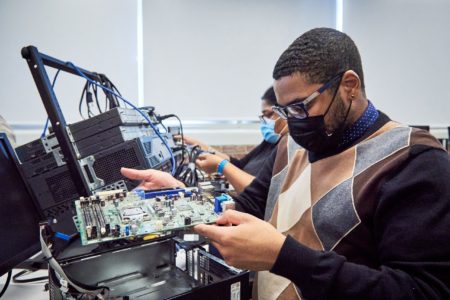
Photo courtesy of Per Scholas
We’ve seen some progress from employers committed to hiring diverse talent, but in 2023, we hope to see a paradigm shift where the industry becomes as diverse as the customers it serves. There is tremendous business benefit for hiring diverse candidates. According to McKinsey and Company, inclusive teams make better decisions up to 87% of the time and diverse teams produce a minimum of 19% more revenue. Yet an analysis of the tech sector shows underrepresentation of Blacks, Hispanics, women, and those without four-year degrees.
That’s why our End of Year Campaign theme is Unlocking Potential: Changing the Face of Tech. Donations to the campaign will fuel our Career Access Fund, which helps ensure that learners have everything they need to succeed. Whether it’s providing a laptop to participate in remote training, the expertise of a career coach that works one-to-one with learners to prepare for their job search, or covering exam fees to obtain an industry-recognized credential, we are committed to breaking down barriers that might hold these motivated, talented individuals back from pursuing their dreams. We know that there are thousands of amazing technologists ready for the opportunity our training provides – join Per Scholas to unlock potential and change the face of technology nationwide.
In 2023, we’ll continue our national expansion, enabling at least 4,500 new adult learners to launch careers in Software Engineering, Cybersecurity, Cloud Support, IT Support, and more. To fuel this growth, we are launching Per Scholas’ Instructor Academy, which will engage at least 100 Per Scholas Alumni to fill roles as Junior Instructors as we continue to grow our national training offering.
Plus, there are many ways for corporate partners and employers to team up with Per Scholas to grow tech talent pipelines for their enterprises. Custom-designed training courses on specific skill sets in key markets nationwide are a marquee offering of Per Scholas in the year ahead.

Rey Saldaña
Rey Saldaña, President and CEO, Communities In Schools
The importance of how schools are built to tackle the incredible challenges posed by poverty, COVID recovery, and an uncertain economic future for families is at the forefront of every educator’s mind this year. Gone are the days to view schools simply as a place to house excellent principal leaders, determined teachers, and rich academic curriculum.
In this environment, Communities In Schools is clear-eyed about the opportunity to expand a relationship-centered, human capital approach guided by research on how to deliver for sustainable impact at the school and student level. We have been steadily growing and learning over the past 45 years, but the next few years will see the greatest test of how to grow with quality, in a moment of urgent need.
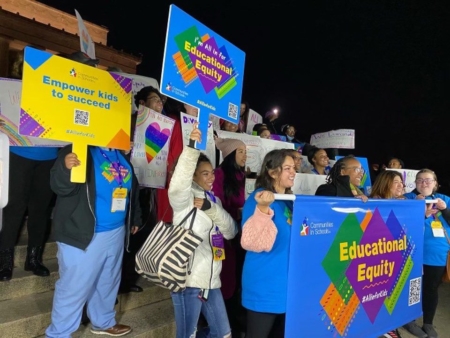
Photo courtesy of Communities In Schools
Today, we have approximately 4,000 staff operating in 113 communities across the country. This represents 26 states, and we have been asked to accelerate scale into new communities to meet the need of school leaders and legislators who have been looking for organizations with a track record of impact, and a design that fits diverse contexts in rural, urban and suburban communities.
As a product of Communities In Schools myself – which means I connected to Mrs. Reyes, my school-based site coordinator in San Antonio, Texas – I know the difference one person can make in the lives of students and the climate in school. My charge as leader of this national network is to understand what it will take to expand into every school that needs our model and direct support across the country.
Debra Rainey is communications manager at Independent Sector. Learn about other Independent Sector members and becoming a member.

